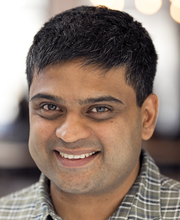MFA Graduation Reading
Second year MFA students who will be graduating in May will read from their theses.
Second year MFA students who will be graduating in May will read from their theses.
Abstract: The exceptional ability of crystalline lattices to alter electronic properties brought about the semiconductor electronics revolution and continues to surprise us. Recently, electrons in artificial moiré lattices have emerged as an extraordinary new platform. The simplest such moire' material consists of a pair of graphene sheets twisted relative to one another. At a "magic" twist angle of about 1 degree, a variety of interesting phenomena including superconductivity and zero-field quantum Hall effect are observed. In this talk, I will review this rapidly moving field and describe the new perspectives it has provided on the geometry of quantum states and the mathematical foundations behind it. Finally, I will detail how this newfound understanding led us to propose a new class of moiré superconductors, beginning with twisted trilayer graphene, which is presently under intensive experimental examination.
Coffee and tea will be served in CP 179 starting at 3:30 PM.

Ashvin Vishwanath is a condensed matter theorist who studies collective phenomena in quantum systems. His previous research has brought to light new insights and discoveries, including the central role of "hedgehog" defects in phase transitions, the occurrence of distinctive surface states in Weyl semimetals, Dirac fermion dualities and the notion of surface topological order. Presently, his attention is focused on unraveling the mysteries of moiré materials and exploring ways to create highly entangled states in synthetic quantum platforms.
Ashvin was born and raised in Bangalore, India and earned his undergraduate degree in Physics from the Indian Institute of Technology Kanpur. He then moved to Princeton University for his PhD, under Duncan Haldane following which he held a Pappalardo postdoctoral fellowship at MIT and then moved on to a faculty position at the University of California, Berkeley. He spent twelve years on the faculty at UC Berkeley, before moving to his current position in 2016 as Professor of Physics at Harvard University. He is also the Director of the Simons Collaboration on Ultra Quantum Matter, He has been awarded the Sloan and Guggenheim Fellowships, the 2016 Europhysics Prize, and was elected to the American Academy of Arts and Sciences in 2021.
******
The van Winter Memorial Lecture is an annual lecture sponsored jointly by the Department of Mathematics and the Department of Physics and Astronomy. It honors the memory of Clasine van Winter, who held a professorship in the Departments of Mathematics and of Physics and Astronomy from 1968 until her retirement in 1999. Professor Van Winter specialized in the study of multiparticle quantum systems; her contributions include the Weinberg-van Winter equations for a multiparticle quantum system and the so-called HVZ Theorem which characterizes the essential spectrum of multiparticle quantum systems. She passed away in October of 2000. A list of past van Winter Lectures is available here.
Residency credit for dissertation research after the qualifying examination. Students may register for this course in the semester of the qualifying examination. A minimum of two semesters are required as well as continuous enrollment (Fall and Spring) until the dissertation is completed and defended.
Residency credit for dissertation research after the qualifying examination. Students may register for this course in the semester of the qualifying examination. A minimum of two semesters are required as well as continuous enrollment (Fall and Spring) until the dissertation is completed and defended.
Independent study on a topic mutually acceptable to instructor and student in Judaic Studies.
As a foundational course to the Honors curriculum, Knowledge and Society takes a vested interest in helping students develop an appreciation for the pursuit of truth and knowledge. By exploring the links between subjective and social phenomena, students will gain a clearer understanding of the way inquiry and curiosity are implicated in our familial, cultural, historical, and political worlds. This course aims to foster an environment where students are equipped with the tools to confidently discern the assumptions, premises, and expectations of variant claims to knowledge and truth.
Honors Seminar courses vary in topic by professor and are announced prior to course registration. These courses are interdisciplinary, discussion-based seminars that offer an examination or survey of topics related to the histories, cultures, and constructions of knowledge. Course format and work encourages critical and creative thinking skills by requiring students to be active collaborators in the knowledge constructed by the course and through innovative or experimental projects, assignments, or research that emphasizes the value of intellectual and cultural contributions to society.
Honors Social Sciences courses vary in topic by professor and are announced prior to course registration. The courses engage students in the exploration of relationships between individuals and society and how scholars have come to understand these relationships using conceptual models and processes of inquiry. This interdisciplinary course will focus on the subjective, communal, and structural aspects of society, with the goal of helping students to critically enhance their understanding of the complex and diverse phenomenon that is human social life.
Honors Arts and Creativity courses vary in topic by professor and are announced prior to course registration. These courses engage students in exploration and analyses of creative processes, the artifacts they yield, and the cultural significance of works of art, including but not limited to visual, verbal, musical, spatial, or kinesthetic forms of expression. These courses feature Honors pedagogy by encouraging students to engage in creative thinking, intellectual risk-taking, collaborative knowledge construction, and active participation in class discussion.
Honors Advanced Seminar courses vary in topic by professor and are announced prior to course registration. These courses are interdisciplinary, discussion-based seminars that offer intensive examination of topics related to the histories, cultures, and constructions of knowledge.